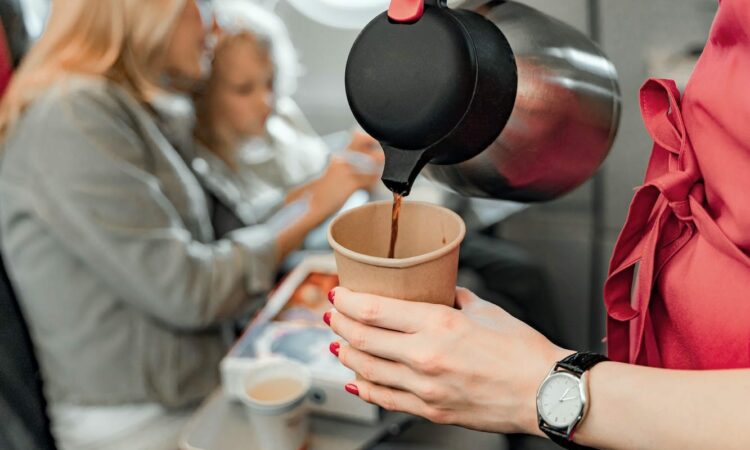- Ordering coffee or tea on flights is tempting, but you should probably opt for a different drink.
- Many flight attendants avoid drinking coffee or tea on an airplane.
- A 2019 study found that many international and US airlines had low-quality or unhealthy tap water.
- Visit Insider’s homepage for more stories.
Flights can hard on all of us. Sometimes, the only saving grace is a nice warm cup of tea or coffee to wake us up and help us feel refreshed after hours in the air. But you may want to think twice before you order that English breakfast blend.
Load Error
As NBC 5 previously reported, the water for in-flight tea and coffee comes from the tap, not from a bottle.
Flight attendant Kat Kamalani said in a TikTok video from January that most airline crew members don’t actually drink beverages made with water from the plane.
“Rule number one, never consume any liquid that is not in a can or a bottle,” Kamalani said in the TikTok video.
It’s not the coffee beans or tea leaves the flight attendants are avoiding – it’s the tap water, crew members said.
A study of airline water conducted in 2019 by the Hunter College NYC Food Policy Center at the City University of New York and DietDetective.com examined the Environmental Protection Agency’s standards for water safety and found that “many airlines have possibly provided passengers with unhealthy water.”
After analyzing and scoring 11 major international airlines and 12 United States regional airlines for their quality of drinking water, the study found that seven international airlines and nearly all of the regional airlines had poor water quality.
In an earlier 2004 EPA sample of 158 planes, 13% contained the bacteria coliform. Two of the airplanes were found to have dangerous E.coli in the water, according to the sample. And as Insider previously reported, an additional EPA study found that one in every eight planes fails the agency’s standards for water safety.
“Water onboard is regulated under the Environmental Protection Agency to ensure safe drinking water on the aircraft,” the Association of Flight Attendants-CWA previously told Insider. “The Association of Flight Attendants-CWA pushed for this regulation over 15 years ago. The regulation gives broad discretion to airlines on how often they must test the water and flush the tanks. AFA does not believe this regulation goes far enough or is sufficiently enforced.”
The bacteria is likely delivered while the water is in transit, NBC 5 reported. According to a 2015 study in the International Journal of Environmental Research and Public Health, more microorganisms exist in the transport vehicles than in the water’s original source, thus transferring the organisms from truck to plane.
Flight attendant Kamalani also linked the quality of water to the infrequency the hot-water machines are cleaned, Insider previously reported.
On TikTok, Kamalani urged people to steer clear of coffee and tea since the machines “are rarely cleaned unless they are broken,” she says in a video she posted in January.
Dr. Cedric Spak, an infectious disease specialist at Baylor University Medical Center, told NBC 5 that people with a compromised immune system should steer clear of the in-flight beverage. He additionally noted that people with infants should “think twice” before filling a baby’s bottle with airplane tap water.
“That doesn’t sound like a very good idea,” he said.
The 2019 airline water study by the Hunter College NYC Food Policy Center at the City University of New York and DietDetective.com came to a stronger conclusion: “NEVER drink any water on board that isn’t in a sealed bottle. Do not drink coffee or tea on board.”
Travel + Leisure reporter Stacey Leasca contributed to this report originally published in 2018.
Source: Read Full Article

